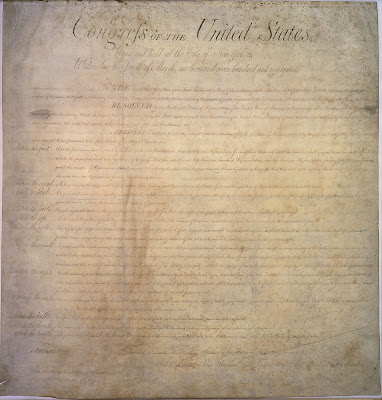By Carol Gee
Did Senators and House members learn anything while they were gone from Washington? What did the members hear while they were out on recess? We can assume they got an earful of criticism, given what they did and did not accomplish. The Polling Report.com. reports on current Congress - Job Rating figures. They show approvals percentages mostly in the low 20s, with Gallup at 18.
How could this group be so clueless? Perhaps it is due to the fog of war. Do those who represent us need night vision goggles to see what the public sees? Democrats and Republicans, who compromised away our constitutional Fourth Amendment civil liberty protections in a late night rush to amend the Foreign Intelligence Surveillance Act and leave town, may have thought they were exercising bipartisanship. But it was complete surrender to the Bush administration's dark designs on unrestrained Executive power. The weapons used against legislators was raising fears of being accused of being unpatriotic and weak on fighting terrorism. Glenn Greenwald reminds us of how dangerous this is:
The severe dangers from allowing the government to engage in surveillance of Americans' communications with no oversight ought to be self-evident. That government leaders will abuse unchecked powers is the most basic premise of our country since its founding, and independently, the dangers are obvious.
But reasoning of that sort is not even required to appreciate and convey to Americans why oversight-less spying powers of the type the Congress just vested in the Bush administration are so pernicious.
In the light of day Congress must act to rectify its mistakes. The repairs should include a number of fixes that will remedy legislating in the dark. They need to see to it that more Senators and Members (particularly the Judiciary Committees, who are responsible for Constitutional protections) receive the administration's intelligence briefings. Though all Members and Senators already have security clearances, they should get security clearances for more of their key staff members. And they must prepare themselves with knowledge. For example Firedoglake's "looseheadprop" posted this on 9/3/07: "Every member of Congress should read this book." To quote:
So, why am I writing about it anyway? Because this book, called National Security Investigations and Prosecutions, by David Kris and Douglas Wilson appears to be the most up to date, comprehensive treatise on this area of law yet available.
When the lights come back on in the Capitol today, the House and Senate will be in a position to do the jobs for which they were elected. The Constitution gives them the power of the purse, which they should begin to exercise over the administration, when it uses bullying tactics. The normal checks and balances between branches of government need to be restored. As Mickey Edwards said simply on C-SPAN in a recent forum at the Center for American Progress, "do this and the department handling the job will get its money. Otherwise you won't." This great C-SPAN discussion is worth watching again:
Center for American Progress Discussion on FISA Amendments - PM Session
. . . examines recent amendments to the Foreign Intelligence Surveillance Act (FISA). Panelists on the "Restoring Checks and Balances" discussion included: Mary DeRosa, Chief Counsel for National Security, Senate Judiciary Committee ; Former Rep. Mickey Edwards (R-OK); and others.
And then there is the fog of the War in Iraq, made foggier by the President's recent "photo-op" visit to the civil-war torn country. Many members themselves visited during the recess. Now they must deal with what they know or should know about the upcoming course of the war. This story summarizes it well: On 8/29/2007, U.S. News & World Report headlined, "Congress Braces for a Bruising September, A contentious debate on the future of Iraq is in the offing" by Danielle Knight, August 28, 2007. To quote:
. . . expect fireworks when Congress returns in September. Lawmakers are preparing for a lineup of passionate debates, hearings, and votes on the Iraq war when they return after Labor Day. In addition to debate over the president's proposed $145 billion war spending bill, the House will hold hearings next week on two new key reports on the military and political situations in Iraq. And both chambers will be anxiously awaiting the midmonth testimony by Gen. David Petraeus and U.S. Ambassador Ryan Crocker.
Members of the legislative branch are respected even less than our current president. How could they go any lower by acting in a courageous and well-informed manner to actually protect the country?
(Cross-posted at South by Southwest.)
Labels: civil liberties, Congress, Democrats, U.S. Constitution, war on terror










